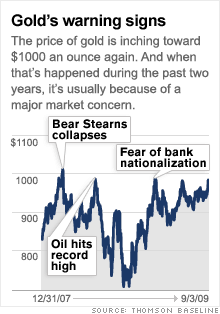Uh oh. Gold's near $1,000
With gold nearing last year's highs, it's a cause for concern. But it is probably more a sign of long-term inflation worries than fear of another financial collapse.


NEW YORK (CNNMoney.com) -- Are gold investors starting to sense something wrong that others are missing?
The price of gold is nearing $1,000 an ounce. It closed at $997.70 Thursday, up $19.20 from Wednesday. This rise might be a cause for concern.
In the past two years, gold has flirted with the "box of ziti" level -- a bit of slang for $1,000 from a memorable "Sopranos" episode -- a couple of times. And that usually has coincided with a time of immense strain in the markets
Gold hit a record high of about $1,014 in March 2008, just when Bear Stearns was on the verge of collapse before being "rescued" by the Federal Reserve and JPMorgan Chase (JPM, Fortune 500).
A couple of months later, gold got close to $1000 again due to worries about inflation and a weak dollar. Gold's rise matched oil's march to a record high.
Finally, gold got close to $1000 again in late February of this year, a time when investors were fretting that big banks such as Citigroup (C, Fortune 500) and Bank of America (BAC, Fortune 500) might need to be nationalized.
So what's driving the gold rush this time around? It is hopefully something less sinister than fear of imminent financial doom.
It simply may just be traders looking to hedge their bets a bit as investors begin to worry if the stock market rally that began in March has come too far too fast.
"There hasn't been too much big news driving up gold prices. There is no major catalyst," said Kathy Lien, director of currency research at GFT, a foreign exchange and futures brokerage firm in New York. "I don't think it's a fear of instability in the financial sector. It does reflect skepticism about the strength of the global recovery."
Lien added that in light of how much money has been pumped into the financial system by the Federal Reserve in the past year, some investors may also be worrying about the dollar weakening again. That could drive up prices and cause investors to rush for tangible assets, such as gold, as a safe haven.
"It's prudent for investors in general to increase their exposure to gold given the risks of inflation in the future," Lien said.
Still, inflation may not be that big of a worry right now. While the dollar has weakened against the euro and yen lately, investors in other assets don't appear to be fretting about pricing pressures.
Oil prices have retreated in recent days for many of the same reasons that stocks have pulled back. With investors pondering just how strong a global economic recovery will be, that leads to the inevitable question of whether oil prices really reflect true demand.
In addition, U.S. Treasury bond prices have slipped in the past few weeks, pushing their yields higher. (Bond prices and rates move in opposite directions.) The yield on the U.S. 10-year note is currently about 3.3%, down from around 3.8% just a month ago. Higher bond rates are typically a sign of more inflation concerns.
With that in mind, Stefane Marion, Chief economist and strategist National Bank Financial Group in Montreal, wrote in a report Wednesday that the spike in gold may soon fizzle.
More evidence that the economy is in fact recovering could deflate double-dip recession fears. And if the Fed drops more hints that it is getting closer to employing a so-called exit strategy for its various lending programs, investors will have less reason to worry about run-away inflation.
"The price of gold has had two major drivers lately -- the need for a haven in turbulent times and fear of a return of inflation," Marion wrote. "Fewer investors will need gold as a haven as the economy begins growing again. As for the need to hedge inflation, we do not expect the world's central bankers to lose control of inflation."
But another strategist worries that it may not be that easy for central banks to rein in inflation. Subodh Kumar, an independent market strategist with Subodh Kumar & Associates in Toronto, said that since the U.S., some European nations and Japan face such big budget deficits, they may look to buy gold as a reserve.
This means that there could be more demand for gold -- even if demand for oil and other commodities doesn't pick up. So the pattern of gold and oil rising in tandem as they did for a big stretch last year and earlier this year may be over.
"With high budget deficits and uncertainty about how to get out of them, gold is a good diversification for large central banks and sovereign wealth funds," Kumar said. "That would lead gold to move in a separate fashion than other industrial commodities."
Talkback: Are you buying gold? How much higher could gold prices go? Share your comments below. ![]()

